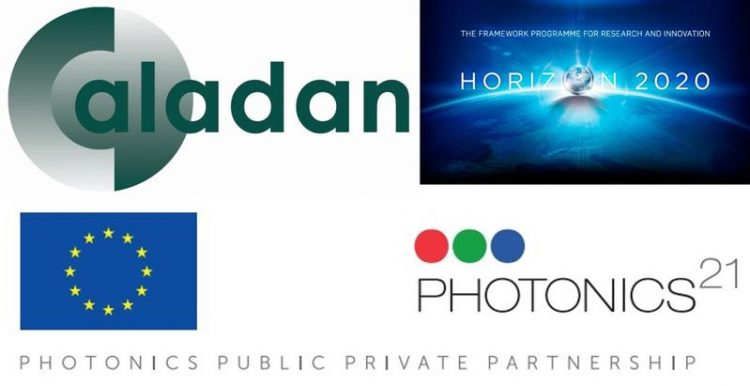EU project CALADAN set to reduce manufacturing cost of Terabit/s capable optical transceivers

Project Logo and Funding Logos
CALADAN is an EU H2020 project, coordinated by IDLab, an imec research group at the Ghent University, which will establish a supply chain for fabrication of optical transceivers at significantly lower cost and higher throughput than what is achievable using current fabrication methods.
The CALADAN project is an initiative of the Photonics Public Private Partnership and is funded under the H2020 ICT Call; it started on 1st January 2019 and will run for 4 years. The CALADAN consortium consists of 3 leading European research institutes, 3 large enterprises and 3 small-to-medium enterprises.
Over the past decade, we have witnessed the rapid emergence and adoption by our society of internet and cloud based software applications such as e-commerce, e-governance, e-health, video-on-demand, massive online gaming, social media platforms, internet search engines, etc. Behind the scenes, all these software applications are running on large, warehouse-scale data centers.
The amount of data and computations that need to be handled by such data centers is still growing exponentially. The anticipated rollout of 5G, Artificial Intelligence and Internet-Of-Things technologies is set to put further pressure on data centers.
CALADAN addresses in particular the communication links inside data centers that connect the individual servers together. Within 5-10 years from now, the industry foresees a need for fiber-optic transceivers with capacities close to or even beyond 1Terabit/s. Currently, no known solution can provide such bandwidths at reasonable costs and power consumption.
CALADAN will develop integration technology based on micro transfer printing of high-speed SiGe BiCMOS electronics and GaAs quantum laser chiplets onto Silicon Photonics wafers. The technology can integrate optics and electronics in massively parallel steps fully at the wafer level, thus significantly increasing the fabrication throughput and reducing manufacturing cost.
The CALADAN consortium consists of the following partners:
1. imec and Ghent University, Belgium, as coordinator
2. University College Cork – National University of Ireland, Cork and Tyndall National Institute, Ireland
3. IHP GMBH – Innovations for high performance microelectronics, Germany
4. X-Celeprint Limited, Ireland
5. Innolume GMBH, Ireland
6. Mellanox Technologies LTD, Israel
7. Xilinx Ireland unlimited company, Ireland
8. Ficontec Service GMBH, Germany
9. EV GROUP E. Thallner GMBH, Austria
Dr. Patrick Steglich
https://www.imec-int.com/en/articles/eu-project-caladan-set-to-reduce-manufactur…
Media Contact
All latest news from the category: Information Technology
Here you can find a summary of innovations in the fields of information and data processing and up-to-date developments on IT equipment and hardware.
This area covers topics such as IT services, IT architectures, IT management and telecommunications.
Newest articles

A universal framework for spatial biology
SpatialData is a freely accessible tool to unify and integrate data from different omics technologies accounting for spatial information, which can provide holistic insights into health and disease. Biological processes…

How complex biological processes arise
A $20 million grant from the U.S. National Science Foundation (NSF) will support the establishment and operation of the National Synthesis Center for Emergence in the Molecular and Cellular Sciences (NCEMS) at…

Airborne single-photon lidar system achieves high-resolution 3D imaging
Compact, low-power system opens doors for photon-efficient drone and satellite-based environmental monitoring and mapping. Researchers have developed a compact and lightweight single-photon airborne lidar system that can acquire high-resolution 3D…





















